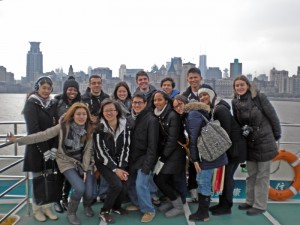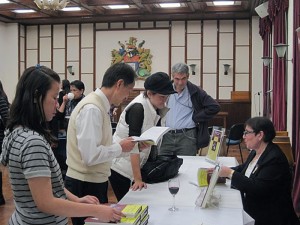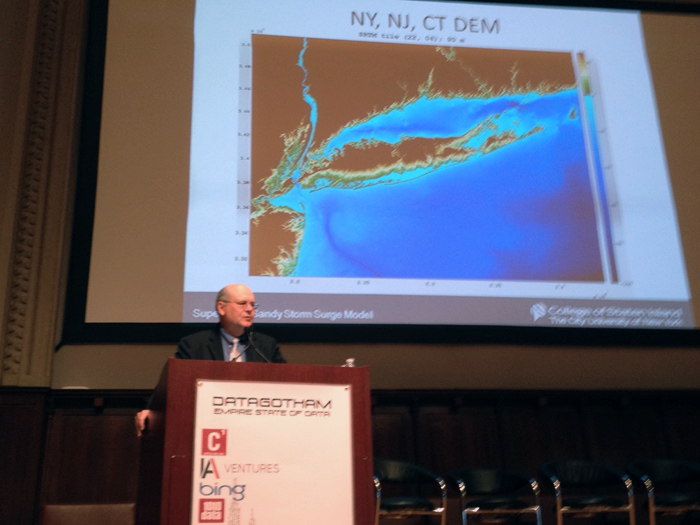
A cruise along the Pu Jiang River with Shanghai’s famous Bund in the background is the World Class-room for CSI and CUNY students this January.
CSI’s Center for International Service has been sending students to China as part of their study abroad program for a number of years, but this Winter Session marks the first time that a CSI professor has traveled to China to teach one of her courses in the program.
Nan Sussman, Associate Professor of Psychology at CSI, is teaching Psychology 217: Psychology and Chinese Culture at Shanghai University in China this January. Sussman, a two-time Fulbright award recipient will join CUNY students in the intensive four-week Winter Session to teach her course on Chinese culture, through a psychology researcher’s lens. According to her syllabus, “We will focus on the role of Chinese culture in shaping psychological concepts, thinking, and behavior and on psychological research generated by investigators in China and other East Asian countries.”
[flowplayer src=’https://csitoday.com/wp-content/uploads/video-player/assets/video/Corporate_Repatriots.mov’ width=320 height=180 splash=’https://csitoday.com/wp-content/uploads/video-player/assets/images/corporate_repatriots.png’]
Sussman has written a book on a related subject, entitled, Return Migration and Identity: A Global Phenomenon, a Hong Kong Case. She has been presenting the book throughout Hong Kong and China since November and is internationally recognized for her research on the psychological consequences of Chinese return migration. Sussman was awarded a Fulbright grant in 2004 to interview 50 “re-emigrants,” people who moved from Hong Kong to Western countries and then returned, in order to gauge how they coped with the transition. “As a research psychologist, I am interested in understanding the process of cultural transitions and developing solutions to minimizing the distress associated with these transitions,” said Sussman. “I am particularly interested in reverse culture shock, the process of returning to your home country, either by sojourners (teachers, students, business personnel, missionaries, etc) or immigrants, and the subsequent changes in identity.”
There are 26 CUNY students attending this Winter Session in Shanghai, taking courses like Intensive Beginning Chinese, Business in Contemporary China, and the aforementioned Psychology and Chinese Culture that is new to the Winter Session curriculum. The course will introduce students to Chinese history and compare Chinese psychology to its Western counterparts. Field trips to area schools and a traditional Chinese medicine hospital have been arranged in order for the CUNY students to experience the day-to-day lives of Chinese people firsthand. Psychology 217 will also introduce students to the concept of the Chinese Diaspora and “return migration.” The course has attracted both students of Chinese ancestry and non-Chinese students interested in learning more about how Chinese culture influences the individual. “In learning the Chinese perspective, they will learn about their own culture,” said Russell Davis, Study Abroad Advisor and CUNY China Programs Coordinator. All of the classes taught in the China Study Abroad Program feature multiple field trips and guest lectures by Shanghai experts that will assist the students in gaining more perspective into the disciplines.
The China program also includes summer and full semester sessions as well as year-long programs. In addition, the Center for International Service offers programs in cooperation with partner institutions in China where “they send students to us to learn English and American culture, especially pertaining to the five boroughs,” said Ann Helm, Director of the Center for International Service. CSI has offered a professional development program in the summer in which CSI and CUNY faculty and staff participated in a Educators Study Tour to partner schools to learn about issues in higher education in China. “CSI is unique because of its diversity,” said Helm, addressing CSI’s ability to maintain relationships with any number of other universities around the world. The Center for International Service is unique because it makes CSI one of the few colleges in the country that has a built-in support structure for handling overseas development. “If there is an opportunity we can respond quickly.”
Through the Center for International Service, CSI can support many international relationships that benefit all of CUNY’s students both at home and abroad. Students at CSI get the opportunity to meet other students and faculty from different walks of life, enabling them to view their own communities with an international understanding. The students who choose to study abroad can do so in over 30 countries in low-cost, high-quality programs where they earn academic credit and have many scholarship opportunities. As Davis puts it, “all of our students come back tuned into the world—they are all connected.”

![[video] Award-Winning Professor Joins Shanghai Winter Session Lineup](https://csitoday.com/wp-content/uploads/2011/01/pu_jiang_river_cruise_011311.jpg)














